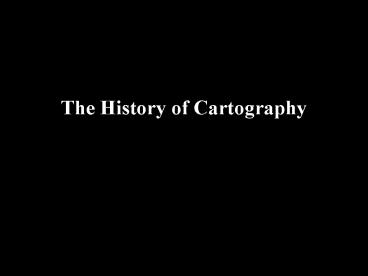The History of Cartography - PowerPoint PPT Presentation
1 / 56
Title: The History of Cartography
1
The History of Cartography
2
(No Transcript)
3
(No Transcript)
4
Nippur, Babylonia, 1500 BC
5
(No Transcript)
6
(No Transcript)
7
Anaximenes world, 500 BC. The world as a
floating rectangle
8
(No Transcript)
9
(No Transcript)
10
Claudius Ptolemy of Alexandria, AD 90-168, the
sum of Greek Geography, shows climate zones via
day length on a conic projection.
11
Ptolemys Nile
12
Orbis Terrarum of the Romans, on which almost the
entire Earth is part of the Empire
13
The oldest known Chinese map is a stone tablet
engraved in A.D. 1137, likely based on Chia Tans
map of 801. The map shows the Great Wall crossing
the Yellow River (Hosie).
14
Chart of the Marshall Islanders showing islands
with shells and oceanic swells and currents with
sticks (Journal of Geography, 1928).
15
Greek mathematician, Eratosthenes of Cyrene
(276-194 BC)
- At Syene (now Aswan), some 800 km (500 miles)
southeast of Alexandria in Egypt, the Suns rays
fall vertically at noon at the summer solstice. - Eratosthenes noted that at Alexandria, at the
same date and time, sunlight fell at an angle of
about 7 from the vertical. He correctly assumed
the Suns distance to be very great, therefore
its rays are parallel when they reach the Earth. - Given estimates of the distance between the two
cities, he calculated the circumference of the
Earth at 21, 415.33 miles. Its actual distance
is 24,901.55 miles (40,075.16 kilometers) at the
Equator, a great circle, an error of only 14.
16
(Aswan)
17
- Eratosthenes also applied latitude and a Greek
version of longitude to the known world - He also calculated the Earths axial tilt 23.5
degrees. - And that the Earth travels around the Sun every
365.25 days, inventing Leap Day! - And he was the father of scientific chronology,
fixing the dates of political and literary events
from the conquest of Troy.
18
(No Transcript)
19
This Roman Strip Map shows the roads of the
empire, the Mediterranean (below) and the
Adriatic (above). The 12th Century copy is 1
foot wide and 21 feet long. Here only a small
portion is shown.Source Konrad Miller, Die
Peutingershe Tofel, Stuttgart, 1929.
20
(No Transcript)
21
776 A.D. St. Beatus Map shows the Christianized
view of the world, with an enormous Jerusalem,
the Holy Land, and all others outside Europe
minimized.
22
World map for the Medieval European mind a T
O Map, a disk, centered on Jerusalem, floating
the ocean. Tanais is the Don River, dividing
Asia from Europe.
23
Medieval Arab Map
24
Al Idrisi Tabula, 1100s
25
Christendom emerges from the Dark Ages, Jerusalem
remains at the center.
26
Hereford, England Mappa Mundi, 1300s
27
Leif Ericksons Vinland Map, A.D. 1100
28
Britains Gough map, 1360
29
Europe, 1381
30
Portolan chart, used in14th century European
coastwise sailing
31
Genoese Nautical Chart, 1400s
32
Martin of Behaims Globe of 1492, shows no trace
of the New World
33
Renaissance cartography included the New World
34
Cantino Planisphere, early 1500s
35
Waldseemuller Amerigo Vespucci
36
China, 1500s
37
Indian map of the Cosmos, 1300s?
38
Piri Reis, 1517, Turkish
39
Gerardus Mercators world map, 1569
40
(No Transcript)
41
World map based on Mercator, 1699
42
Mappa Mundi, some date after 1699
43
Cortess Tenochtitlan
44
French map of South America, 1800
45
Benjamin Franklin, 1754
46
(No Transcript)
47
Lewis Clark, 1805
48
(No Transcript)
49
Lewis Clark, 1810
50
1892
51
(No Transcript)
52
(No Transcript)
53
Radar Image of U.S. Topography
54
(No Transcript)
55
(No Transcript)
56
Views of the Earth
- http//www.fourmilab.ch/earthview/satellite.html































